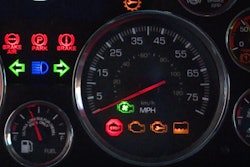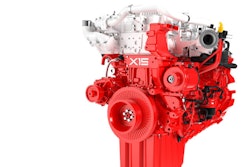- Four truck makers are suing California and CARB over the Clean Truck Partnership (CTP). Truck OEMs claim that, despite Congress overturning the emissions regulations outlined in the partnership, California is using the agreement to continue enforcement of the regs.
- The U.S. Department of Justice sent Cease & Desist letters to the OEMs, calling for them to stop complying with the CTP.
- Caught in the proverbial federal/state crossfire, truck makers seek to clarify legal obligations, all while environmental activists allege the new suit is a "cynical reversal of course."
Four of America’s top truck makers have officially filed a lawsuit in the U.S. District Court for the Eastern District of California challenging the the Clean Truck Partnership (CTP) agreement signed with the California Air Resources Board in 2023.
CARB has argued since the Congressional rollback of its Advanced Clean Trucks and Omnibus Low-NOx rules earlier this summer that despite the federal disapproval of the regulations, the CTP is still binding.
Cummins, Daimler Trucks North America, Hino, Isuzu, then-Navistar, Paccar, the Truck and Engine Manufacturers Association, and Volvo Group North America in July 2023 were among 11 signers of the CTP, an agreement with CARB that pledged truck and engine manufacturers will meet California’s vehicle standards and required the sale and adoption of zero-emission vehicle (ZEV) technology.
Now, Daimler Trucks North America, International, Paccar and Volvo Group North America are suing CARB, its executive officer Steven S. Cliff, and California Gov. Gavin Newsom over the agreement, joining a prior petition filed challenging the CTP.
The OEMs said in the lawsuit that despite the Congressional Review Acts passed this year preempting California’s emissions standards, the state “continues to demand compliance with its heavy-duty emissions standards, and it has threatened OEMs that design, develop, manufacture and sell heavy-duty vehicles and engines ... with civil sanctions and unfavorable regulatory treatment if the OEMs refuse to comply with the state’s unlawful standards, while also taking measures to insulate itself from lawful challenges to those standards.”

Senior Clean Vehicles Advocate for the Natural Resources Defense Council Guillermo Ortiz called the lawsuit, "a cynical reversal of course. These companies helped negotiate the Clean Truck Partnership to secure regulatory certainty. Now they’re trying to dismantle the very deal they shaped -- injecting instability into a market they claim to lead," he said. "This is bad faith, plain and simple, and it raises questions about whether these manufacturers are serious about their ability to deliver clean trucks to the global stage."
[Related: Will CARB's emissions deal with truck makers survive Congress' waiver revocation?]
The OEMs said the U.S. Department of Justice has sent them Cease & Desist letters stating that California’s enforcement of its regulations “is contrary to federal law” and directed the truck makers “to immediately cease and desist compliance with California’s preempted and unlawful mandates.”
This has left the OEMs “caught in the crossfire,” they said, as “California demands that OEMs follow preempted laws; the United States maintains such laws are illegal and orders OEMs to disregard them. This situation is not tenable.”
As such, the lawsuit aims to clarify the OEMs’ legal obligations under federal and state law and to block California from enforcing regulations that are preempted by federal law.
Given the inconsistencies between federal and California regulatory requirements for emissions, truck and engine makers and their trade associations in 2023 petitioned CARB for relief from the state’s “infeasible regulatory requirements,” which resulted in the CTP, the lawsuit added.
Now, according to the OEMs, “California seeks to use the Clean Truck Partnership, which was intended to harmonize compliance with state and federal law, to compel an entire industry to follow California emissions standards that are now in conflict with federal law, and which have been expressly preempted by federal law.”
They added that the state is disregarding the CTP’s “plain language,” which “states that manufacturers are obligated to follow CARB’s emissions regulations ‘regardless of the outcome of any litigation challenging … those regulations, or CARB’s overall authority to implement those regulations,’ not federal legislative action taken to invalidate them.”
[Related: Trump signs resolutions to ‘kill’ California’s emissions waivers]
DOJ’s letter directs OEMs to stop compliance with CTP
In a letter included in litigation documents addressed to Daimler Trucks’ VP of Product Compliance Sean Waters, the Department of Justice’s Environment and Natural Resources Division Acting Assistant Attorney General Adam R.F. Gustafson said CARB’s “so-called ‘Clean Truck Partnership’ is an illegal attempt to enforce preempted state vehicle emission regulations.”
Gustafson said the Congressional Review Acts passed by Congress and signed by President Donald Trump invalidated the Environmental Protection Agency’s preemption waivers for CARB’s Omnibus and ACT regulations, and as a result, the Clean Air Act preempts those regulations. “Federal law thus prohibits CARB from adopting or attempting to enforce those regulations.” The letter added that “CARB may not circumvent federal law by disguising its enforcement of vehicle emissions regulations as an ‘agreement.’”
Gustafson added that “this is particularly true where the purported agreement was entered into under threat of enforcement of the very regulations that federal law preempts. Nor may CARB attempt to enforce preempted regulations by delaying or threatening to withhold certification of new motor vehicles in California.”
The letter concludes that, “because CARB’s regulations are preempted, the Clean Truck Partnership is preempted and unlawful. You must therefore immediately cease and desist your compliance with both the Clean Truck Partnership and its preempted state vehicle emission regulations” (emphasis in original).
[Related: California fires back at Trump, doubles down on emissions regs]
OEMs stuck between a rock and a hard place
The regulatory back-and-forth between the federal government and California/CARB has put OEMs “in an impossible position,” they said in the lawsuit. “As a result, the OEMs are subject to two sovereigns whose regulatory requirements are irreconcilable and who are openly hostile to one another. Each wields a hammer to enforce its will on industry, leaving OEMs -- who simply seek to sell heavy-duty trucks in compliance with the law -- unable to plan with the necessary certainty and clarity where their products need to be certified for sale and by which regulatory authority.”
California, citing the CTP, has contended that in order for OEMs to legally sell trucks in the state, they must obtain certification from CARB. Yet the OEMs said this process “takes months,” adding that they “need to know within a matter of weeks whether they must obtain a model year 2026 certification from CARB in order to lawfully sell their products in California and other opt-in states, which together represent approximately 25% of the national market for new vehicle registrations for heavy-duty vehicles.”
[Related: EPA announces end to 5-mph DEF derates on new and existing trucks]
In filing the lawsuit, the truck makers said they are looking for “declaratory and injunctive relief with the goal of clarifying and establishing the regulatory obligations that they must follow to lawfully offer products for sale in California and the various opt-in states, and to prevent California officials from violating their constitutional rights,” adding that “an expeditious decision is essential.”
The OEMs’ lawsuit joins another suit brought by the Western States Trucking Association that challenged CARB’s authority to enforce the CTP following the federal preemption of the regulations.
[Related: Honor CARB emissions deal: Environmentalists to truck makers]










